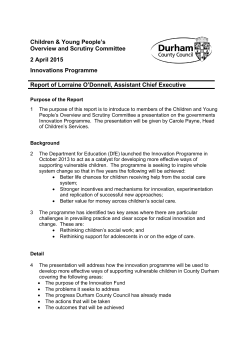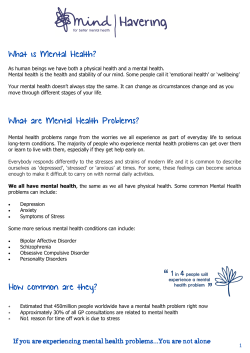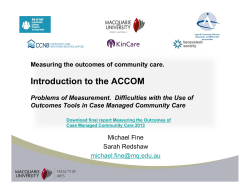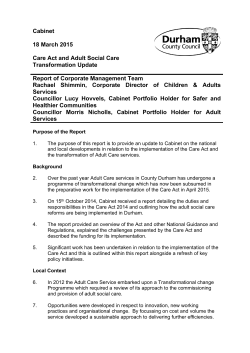
Children & Young People`s Overview and Scrutiny Review of Self
Cabinet – 15 April 2015 Children & Young People’s Overview and Scrutiny Review of Self Harm by Young People Report of Lorraine O’Donnell, Assistant Chief Executive Purpose 1. The purpose of this report is to present the findings, conclusions and recommendations of the Children and Young People’s Overview and Scrutiny Committee working group review report on Self Harm by Young People attached at appendix 2. Background 2. The Children and Young People’s Overview and Scrutiny Committee added Self-harm by Young People to its work programme following its refresh at their meeting in June 2014. Following their concern about the number of young people in County Durham who self-harm, especially those who do not come into contact with services. The committee wanted to raise awareness and understanding of self-harm among young people and adults. 3. The terms of reference for the review were agreed by the Committee at its meeting held on 25th September 2014. The objective of the review is to raise awareness of self-harm by young people to young people and adults involved in their lives and to investigate how early intervention and support can be increased following five key lines of inquiry. What policies and practices does Durham County Council have in place to help, support, prevent and intervene early where looked after children and young people self-harm? How reliable/accurate performance data is and what does it tell us about self-harm in this area compared to regional and national data. What services are available in the community for young people with anxieties or mental health problems to talk to people and how accessible are these services? How are schools addressing students’ issues that may lead them to self-harm? What prevention and early intervention methods do they use? How can awareness of self-harm be increased among young people, parents and carers and what are the signs to look out for? 4. The committee set up a working group of 14 members and gathered evidence over six meetings from key parties including: Public Health Children & Adult Services North of England Commissioning Support Unit DDES CCG North Durham CCG Child & Adolescent Mental Health Services School Nurses Investing in Children Disc Lesbian, Gay, Bisexual and Transgender Young People’s Group Representative from Framwellgate School Durham Representative from Educational Psychologists Team Representatives from Sunderland pact Support Group Representative from Mental Health North East Youth Leader and Young People from Bowburn Youth Club. 5. The review makes seven recommendations which can be found on page 17-18 of the attached report. They relate to: internet safety; development of information pages for parents/carers; update and refresh of school policies on emotional health and wellbeing; and a reminder to governors of services that can be bought in which address emotional health and wellbeing; consideration of how to engage with parents and carers to advise on the importance of good mental health and the warning signs. consideration to a single multi-agency pathway and registry of selfharm; consideration to the role youth workers/leaders can play in providing emotional and wellbeing support to young people in schools; and Consideration to providing basic mental health and emotional wellbeing awareness training to all staff who regularly come into contact with young people. Service Response 6. Children and Adult Services (CAS) and Public Health (PH) offer a joint response to this scrutiny, and welcome the report. Self harm by young people is a problem that is under-reported and which indicates a lack of emotional wellbeing that can foreshadow more serious issues. 7. The committee notes that emotional health and wellbeing, resilience and Child and Adolescent Mental Health strategies are under development. It is anticipated that these strategies will set out the actions to be taken by the Council and partners to ensure that services for young people and parents are in place, and are accessible. 8. The Health and Wellbeing Board and the Children, Young People and Families Partnership will receive these strategies and ensure that implementation and service commissioning matches strategic intentions. 9. Both CAS and PH welcome the emphasis given throughout the report to the voice of children and young people and the voice of parents. It is clear, that in the area of self harm, data are highly problematic and the clearest picture of the issue is often provided by those who experience it. Young people and parents are also best placed to advice on service access, to ensure that actions taken in response to the report are effective. All partnerships should note and mirror this approach. 10. CAS and PH recognise that internet safety is increasingly a key issue for young people. Schools regularly report that many of the disciplinary problems they now address result from mis-use of social media, particularly in relation to bullying. We have seen in the last year how easy it is for young people to form “association groups” around negative issues such as suicide and self harm, and how emotions following tragic events can be whipped up at the touch of a button. Although it is impossible to control social media, CAS and PH support efforts to limit its use in Council buildings and schools. 11. The scrutiny committee has highlighted an important issue in the lack of clear advice and guidance for young people and their parents. We support the committee in efforts to streamline this and provide simple routes to effective information. 12. Clearly schools have a critical role to play in this issue, and CAS and PH will support and recommendations for schools to update emotional health and wellbeing policies, to include information on what services and support is available. 13. CAS and PH note the recommendation relating to the use of youth workers, school nurses and health visitors in preventing young people engaging in self harm and supporting them when they do. Current approaches such as Team Around the School and Team around the Family can already provide this support, and an expansion of these approaches would be welcomed. 14. Similarly, the recommendation on training for all staff who come into contact with children and young people is welcomed. 15. Recommendation E could be misinterpreted, as terms such as “single point of contact” and “registry of self harm services” have a very specific meaning in some services. CAS and PH would support the creation of a single portal for all services for self harm and development of clear information. We anticipate that the strategies under development will lead to commissioning plans for appropriate services and we do not believe that a new single point of contact is required if that means a person or a portal. There is already a single point of contact for all concerns about children, called First Contact, which will signpost to appropriate services. This role would undoubtedly be strengthened by creation of a clear register of self harm services however. First Contact is part of the existing pathway for protection of children, which attempts to identify concerns early and offer help before problems escalate. It is important that this single approach is not undermined by creation of a parallel approach to self harm or other forms of mental health. All agencies must be encouraged to use this pathway. 16. In summary, CAS and PH welcome the report as an important contribution to improving the emotional health and wellbeing of children and young people in County Durham, and will engage, with other relevant partners, in implementing the actions. Recommendation 17. Cabinet is asked to note the recommendations in the report attached (appendix 2, pages 17-18) and to formulate a response within the six month period identified in the report for systematic review of the recommendations. 18. That the report is shared with the Health and Wellbeing Board and the Children and Families Partnership. Contact: Tom Gorman tom.gorman@durham.gov.uk Author: Ann Whitton ann.whitton@durham.gov.uk Tel: 03000 268027 Tel: 03000 268143 Appendix 1: Implications Finance - None Staffing - None Risk - None Equality and Diversity / Public Sector Equality Duty – The review report takes into consideration Equality and Diversity; an Equality Impact Assessment has been carried out. Accommodation - None Crime and Disorder – The review report received information on the impact of alcohol on young people’s offending. Human Rights – None Consultation – None Procurement - None Disability Issues – The report addresses the mental health and emotional wellbeing of young people Legal Implications – None
© Copyright 2025









